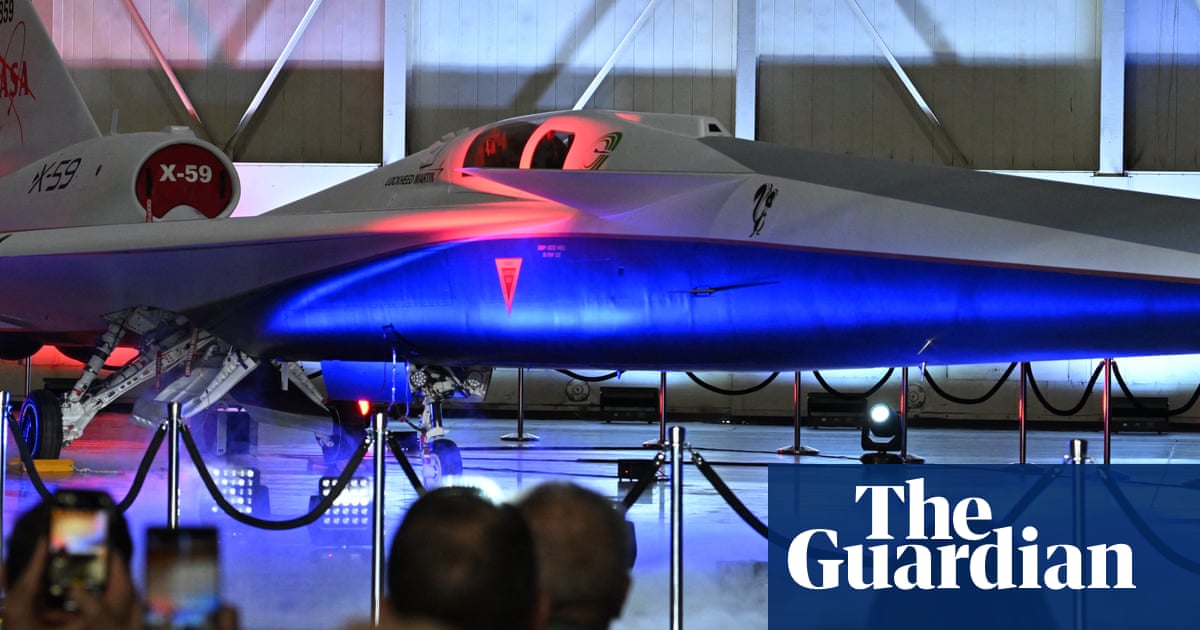- cross-posted to:
- astronomy@mander.xyz
- worldnews@lemmy.ml
- cross-posted to:
- astronomy@mander.xyz
- worldnews@lemmy.ml
In launch event on Friday, agency shared plans to test over US cities to see if it’s quiet enough by engaging ‘the people below’
Nasa has unveiled a one-of-a-kind quiet supersonic aircraft as part of the US space agency’s mission to make commercial supersonic flight possible.
In a joint ceremony with Lockheed Martin Skunk Works in Palmdale, California, on Friday, Nasa revealed the X-59, an experimental aircraft that is expected to fly at 1.4 times the speed of sound – or 925mph (1,488 km/h).
The aircraft, which stands at 99.7ft (30.4 metres) long and 29.5ft wide, has a thin, tapered nose that comprises nearly a third of the aircraft’s full length – a feature designed to disperse shock waves that would typically surround supersonic aircraft and result in sonic booms.



This design may minimize the sonic boom, but that boom cannot be eliminated. “Artist’s impression” image shows … absolutely no room for passengers. This is a design test aircraft focused solely on minimizing shockwave noise. Any passenger plane based on this design is going to be very low capacity, and wholly unable to pull up to a jet bridge at any airport.
This is a technology demonstrator to understand the acoustics of sonic booms. Passenger versions would likely look very different, just incorporating the information gathered from this project.
Why, that is exactly what I said!
No, you said it wouldn’t work as a passenger aircraft. You sound like a naysayer.
Actually, a lot of people including me would naysay even if it is viable. Because this stuff is for rich wankers who don’t need another excuse to burn down planet earth in their search for the next money making scheme.
I said no such thing. What I said was:
I was addressing this, that passenger designs based on this design may not look anything like this airplane. So the constraints of the demonstrator won’t necessaraly carry over to the actual vehicles.
In order to minimize sonic booms, the design must feature an incredibly long, thin nose. That’s what precludes such an aircraft from pulling up to a gate. There’s just not enough room.
If such a passenger plane goes into production, it would need to be hand in hand with airport redesign, and the aircraft would still have a low passenger capacity. Any passenger aircraft with a reasonable capacity would need to be enormous. It’s going to use more fuel to get to M1.4, which will still keep ticket prices high. That means these will be for wealthy people only, if they’re even economically feasible at all.
The concorde (or the knock off, i forget which) had a nose cone that moved, so something like that could be potentially designed for the new aircrafts design too
Please explain why you think that principles learned here cannot inform designs at scale. Do you think it’s the small size of the aircraft which reduces the sonic boom?
To be fair about the jet bridge thing, I’ve definitely been at some pretty major airports (read “SeaTac”) and gone out onto the concrete to board a small plane. The jet bridge is not a deal breaker
Look at boom spersonic’s jet designs: https://boomsupersonic.com/
They’ve already sold future planes to several airlines. It’s happening.